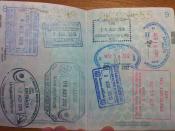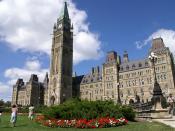The concept of regionalism has been used to show the social, economic, and political
differences that exist between the regions of Canada since the days of confederation.
Historically, Canada has developed in different manners depending on the location, leaving a
region much different from another. One of the major reasons for this can be seen through the
geography of this country. The natural land forms which are present in Western Canada, such as
the prairies, are much different from say the coastal proximity, for example, of Atlantic Canada.
The climate in relation to the different geographical characteristics of Canada attributes to the
different life styles in these regions, ultimately changing their identities. This causes difference
in economies of the regions, in turn affecting the political agenda of each region. The concept of
regionalism has caused many to attack other regions based on the claim that Central Canada
manipulates the rest of Canada economically and politically.
This sparks a notion of regional
identity as opposed to a Canadian Identity. I believe that the idea of regionalism forces us to
focus on the differences we have from other Canadians rather than looking towards our common
traits. We must not forgot the culture that is present in each region as it ultimately affects their
position on matters economical and political. Regionalism is basically a result of a geographic
area transformed into a social area known as a region.
The regions of Canada ; Atlantic Canada, Central Canada, The West, and The North make up
the differences of Canadian identity through the idea of regionalism. The regions differ based on
culture, economics, and politics not to mention the geographical differences.
The Eastern part of Canada known as Atlantic Canada, "is a geographic diversity drawn
together by economic and cultural history." Newfoundland/ Labrador,


